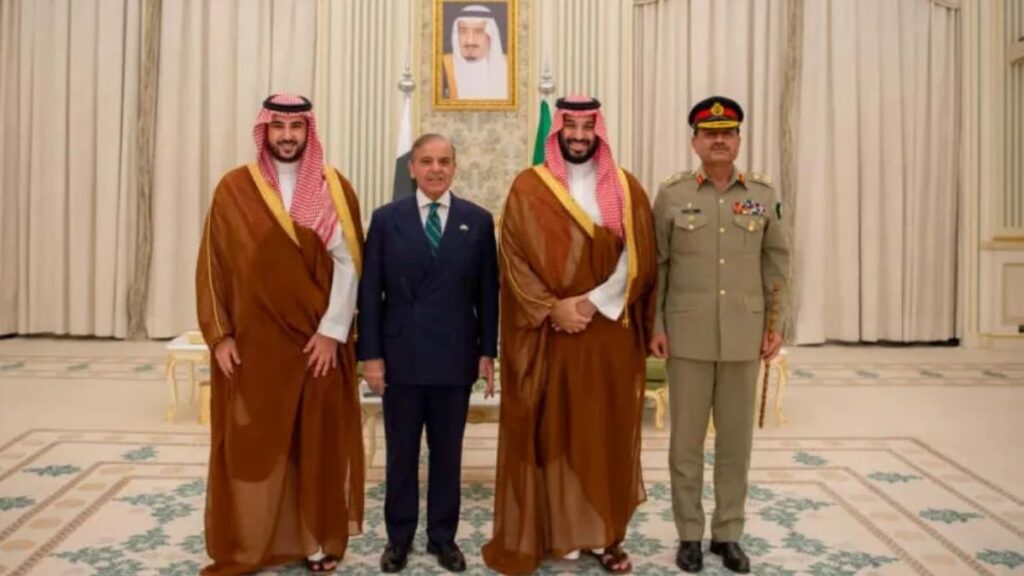Saudi Arabia and Pakistan have signed a mutual defence pact, formalising decades of informal military cooperation. The timing is crucial — it comes days after Israel’s attack on Qatar, amid growing doubts over U.S. security guarantees in the Gulf, the ongoing Gaza war, and the rising threat of Iran-backed Houthis. While Saudi Arabia seeks to hedge its security risks, Pakistan, struggling economically, sees an opportunity to strengthen its role as a security provider.
Key Terms of the Agreement
- Collective Defence Clause – Any aggression against one country will be considered aggression against both.
- Permanent Coordination – Establishment of a joint military committee, intelligence-sharing, and training programmes.
- Historical Context – Pakistan has long stationed troops in Saudi Arabia; the pact upgrades this into a treaty framework.
- Nuclear Dimension (Symbolic) – While not explicitly stated, past cooperation suggests Saudi Arabia views Pakistan’s nuclear capabilities as a potential security guarantee.
Why Now?
- Diminished U.S. Credibility – Saudi confidence in American protection has eroded since:
- 2019 Iran-backed attacks on Saudi oil facilities (U.S. did not intervene).
- U.S. strategic pivot toward East Asia.
- Israeli attack on Qatar despite its hosting of a major U.S. airbase.
- Regional Tensions –
- Gaza War: Israel’s military actions have unsettled Arab monarchies and derailed Saudi-Israel normalisation.
- Houthi Challenge: Despite ceasefires, Houthis still possess strong missile and drone capabilities threatening Saudi oil and shipping.
- Pakistan’s Role – A Muslim-majority nuclear power with surplus military manpower, seeking Saudi financial support to stabilise its economy.
Implications for West Asia’s Security Landscape
- The U.S. push to expand the Abraham Accords (normalising Israel-Arab ties) has stalled.
- Saudi Arabia insists on a Palestinian state before any normalisation with Israel, which Tel Aviv rejects.
- By aligning with Pakistan, Saudi Arabia signals that it is diversifying security alliances, no longer relying only on Washington.
- Risks remain: Pakistan could be pulled into Saudi-Iran rivalries or Yemen’s conflict; Saudi Arabia could get entangled in South Asian tensions.
Impact on India
- Diplomatic Complications: India has deepened ties with Riyadh in recent years — energy cooperation, trade, counter-terrorism, and the welfare of 2.6 million Indian expatriates.
- Balancing Act: India has a visible pro-Israel tilt, while Saudi Arabia is now formalising a pro-Pakistan tilt.
- Strategic Challenge: If Pakistan successfully positions itself as a Gulf security provider, India’s influence may diminish.
- Structural Shift: U.S. dominance in West Asia is no longer guaranteed; regional players are recalibrating.
Way Forward for India
- Maintain balance and engagement — continue strengthening ties with Saudi Arabia and other Gulf states while engaging Iran.
- Prioritise energy security, diaspora safety, and regional stability.
- Recognise that stability in the Gulf is the cornerstone of India’s strategic interests.
✅ Disclaimer: This article is for educational purposes, especially useful for UPSC/State PCS aspirants, and should not be taken as a political opinion.
Follow Fusion IAS

